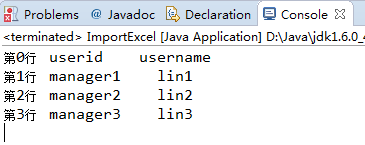如何解析读取excel数据
简介
前段时间完成了一个输出excel的任务,感觉挺开心的,用的就是Apache POI的jar包,Apache POI是Apache软件基金会的开放源码函式库,POI提供API给Java程序对Microsoft Office格式档案读和写的功能。其中
HSSF - 提供读写Microsoft Excel格式档案的功能。
XSSF - 提供读写Microsoft Excel OOXML格式档案的功能。
HWPF - 提供读写Microsoft Word格式档案的功能。
HSLF - 提供读写Microsoft PowerPoint格式档案的功能。
HDGF - 提供读写Microsoft Visio格式档案的功能。
有兴趣的可以查看官方API http://poi.apache.org/apidocs/index.html
今天,又学会了如何从excel中读取想要的数据,觉得代码以后可以复用,故贴上来留着以后用,话不多说,上源码:
源码
package com.excel; import java.io.File; import java.io.FileInputStream; import java.io.IOException; import java.io.InputStream; import java.util.ArrayList; import java.util.List; import org.apache.poi.hssf.usermodel.HSSFCell; import org.apache.poi.hssf.usermodel.HSSFWorkbook; import org.apache.poi.ss.usermodel.Cell; import org.apache.poi.ss.usermodel.Row; import org.apache.poi.ss.usermodel.Sheet; import org.apache.poi.ss.usermodel.Workbook; import org.apache.poi.xssf.usermodel.XSSFWorkbook; /** * * @描述:测试excel读取 * * 导入的jar包 * * poi-3.17-beta1.jar * * poi-examples-3.17-beta1.jar * * poi-excelant-3.17-beta1.jar * * poi-ooxml-3.17-beta1.jar * * poi-ooxml-schemas-3.17-beta1.jar * * poi-scratchpad-3.17-beta1.jar * * jar包官网下载地址:http://poi.apache.org/download.html * * poi-bin-3.17-beta1-20170701.zip */ public class ImportExcel { /** 总行数 */ private int totalRows = 0; /** 总列数 */ private int totalCells = 0; /** 错误信息 */ private String errorInfo; /** 构造方法 */ public ImportExcel() { } /** * * @描述:得到总行数 * * @参数:@return * * @返回值:int */ public int getTotalRows() { return totalRows; } /** * * @描述:得到总列数 * * @参数:@return * * @返回值:int */ public int getTotalCells() { return totalCells; } /** * * @描述:得到错误信息 * * @参数:@return * * @返回值:String */ public String getErrorInfo() { return errorInfo; } /** * * @描述:验证excel文件 * * @参数:@param filePath 文件完整路径 * * @参数:@return * * @返回值:boolean */ public boolean validateExcel(String filePath) { /** 检查文件名是否为空或者是否是Excel格式的文件 */ if (filePath == null || !(WDWUtil.isExcel2003(filePath) || WDWUtil.isExcel2007(filePath))) { errorInfo = "文件名不是excel格式"; return false; } /** 检查文件是否存在 */ File file = new File(filePath); if (file == null || !file.exists()) { errorInfo = "文件不存在"; return false; } return true; } /** * * @描述:根据文件名读取excel文件 * * @参数:@param filePath 文件完整路径 * * @参数:@return * * @返回值:List */ public List<List<String>> read(String filePath) { List<List<String>> dataLst = new ArrayList<List<String>>(); InputStream is = null; try { /** 验证文件是否合法 */ if (!validateExcel(filePath)) { System.out.println(errorInfo); return null; } /** 判断文件的类型,是2003还是2007 */ boolean isExcel2003 = true; if (WDWUtil.isExcel2007(filePath)) { isExcel2003 = false; } /** 调用本类提供的根据流读取的方法 */ File file = new File(filePath); is = new FileInputStream(file); dataLst = read(is, isExcel2003); is.close(); } catch (Exception ex) { ex.printStackTrace(); } finally { if (is != null) { try { is.close(); } catch (IOException e) { is = null; e.printStackTrace(); } } } /** 返回最后读取的结果 */ return dataLst; } /** * * @描述:根据流读取Excel文件 * * @参数:@param inputStream * * @参数:@param isExcel2003 * * @参数:@return * * @返回值:List */ public List<List<String>> read(InputStream inputStream, boolean isExcel2003) { List<List<String>> dataLst = null; try { /** 根据版本选择创建Workbook的方式 */ Workbook wb = null; if (isExcel2003) { wb = new HSSFWorkbook(inputStream); } else { wb = new XSSFWorkbook(inputStream); } dataLst = read(wb); } catch (IOException e) { e.printStackTrace(); } return dataLst; } /** * * @描述:读取数据 * * @参数:@param Workbook * * @参数:@return * * @返回值:List<List<String>> */ private List<List<String>> read(Workbook wb) { List<List<String>> dataLst = new ArrayList<List<String>>(); /** 得到第一个shell */ Sheet sheet = wb.getSheetAt(0); /** 得到Excel的行数 */ this.totalRows = sheet.getPhysicalNumberOfRows(); /** 得到Excel的列数 */ if (this.totalRows >= 1 && sheet.getRow(0) != null) { this.totalCells = sheet.getRow(0).getPhysicalNumberOfCells(); } /** 循环Excel的行 */ for (int r = 0; r < this.totalRows; r++) { Row row = sheet.getRow(r); if (row == null) { continue; } List<String> rowLst = new ArrayList<String>(); /** 循环Excel的列 */ for (int c = 0; c < this.getTotalCells(); c++) { Cell cell = row.getCell(c); String cellValue = ""; if (null != cell) { // 以下是判断数据的类型 switch (cell.getCellType()) { case HSSFCell.CELL_TYPE_NUMERIC: // 数字 cellValue = cell.getNumericCellValue() + ""; break; case HSSFCell.CELL_TYPE_STRING: // 字符串 cellValue = cell.getStringCellValue(); break; case HSSFCell.CELL_TYPE_BOOLEAN: // Boolean cellValue = cell.getBooleanCellValue() + ""; break; case HSSFCell.CELL_TYPE_FORMULA: // 公式 cellValue = cell.getCellFormula() + ""; break; case HSSFCell.CELL_TYPE_BLANK: // 空值 cellValue = ""; break; case HSSFCell.CELL_TYPE_ERROR: // 故障 cellValue = "非法字符"; break; default: cellValue = "未知类型"; break; } } rowLst.add(cellValue); } /** 保存第r行的第c列 */ dataLst.add(rowLst); } return dataLst; } /** * * @描述:main测试方法 * * @参数:@param args * * @参数:@throws Exception * * @返回值:void */ public static void main(String[] args) throws Exception { ImportExcel poi = new ImportExcel(); List<List<String>> list = poi.read("D:/user.xls"); if (list != null) { for (int i = 0; i < list.size(); i++) { System.out.print("第" + (i) + "行"); List<String> cellList = list.get(i); for (int j = 0; j < cellList.size(); j++) { //System.out.print(" 第" + (j + 1) + "列值:"); System.out.print(" "+cellList.get(j)); } System.out.println(); } } } }
package com.excel; /** * * @描述:工具类 * */ class WDWUtil { /** * * @描述:是否是2003的excel,返回true是2003 * * @参数:@param filePath 文件完整路径 * * @参数:@return * * @返回值:boolean */ public static boolean isExcel2003(String filePath) { return filePath.matches("^.+\\.(?i)(xls)$"); } /** * * @描述:是否是2007的excel,返回true是2007 * * @参数:@param filePath 文件完整路径 * * @参数:@return * * @返回值:boolean */ public static boolean isExcel2007(String filePath) { return filePath.matches("^.+\\.(?i)(xlsx)$"); } }
运行结果


说明
之所以使用了HSSF,又使用了XSSF,是为了兼容性。
使用HSSF读取Excel2003以前(包括2003)的版本,使用XSSF读取Excel2007的版本。
XSSF和HSSF虽然在不同的包里,但却引用了同一接口Workbook,于是想到了这样的读取方法。
/** 根据版本选择创建Workbook的方式 */ Workbook wb = null; if (isExcel2003) { wb = new HSSFWorkbook(inputStream); } else { wb = new XSSFWorkbook(inputStream); }

 浙公网安备 33010602011771号
浙公网安备 33010602011771号